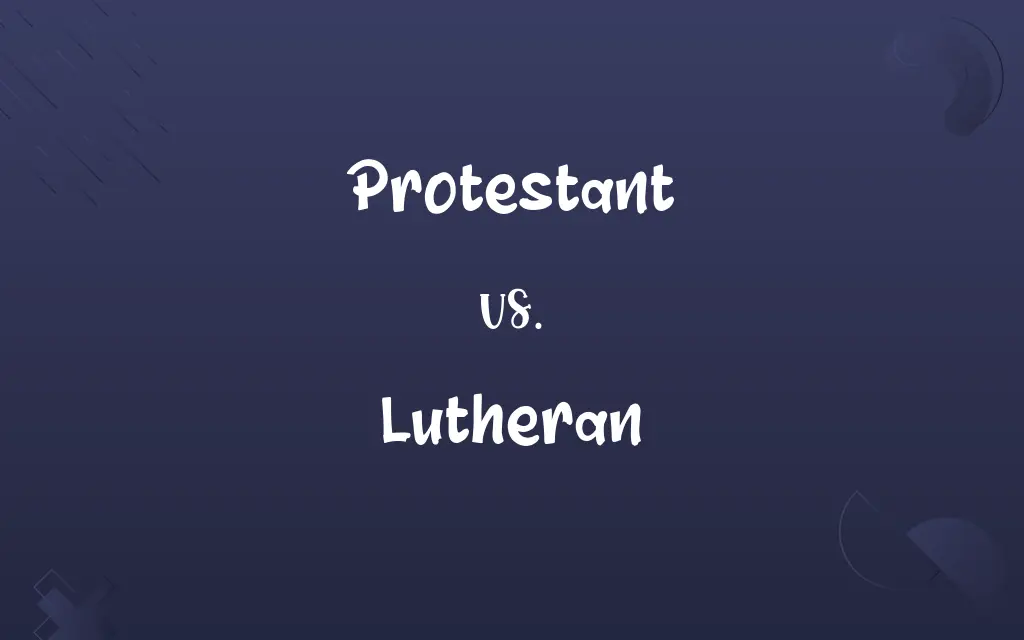Protestant vs. Lutheran: Know the Difference

By Shumaila Saeed || Published on February 28, 2024
Protestantism is a broad Christian movement, while Lutheranism is a specific branch within Protestantism, founded on Martin Luther's teachings.

Key Differences
Protestantism encompasses various Christian denominations that broke away from the Catholic Church, while Lutheranism specifically follows the teachings of Martin Luther, a key figure in the Protestant Reformation.
Shumaila Saeed
Feb 28, 2024
The Protestant movement began in the 16th century as a reform against Catholic practices, with various leaders including Martin Luther. Lutheranism specifically refers to those who adhere to Luther's theological teachings.
Shumaila Saeed
Feb 28, 2024
While both Protestant and Lutheran beliefs emphasize salvation by faith alone, Lutheranism uniquely upholds the doctrine of "justification by faith alone," as strongly articulated by Luther.
Shumaila Saeed
Feb 28, 2024
Protestant churches vary widely in worship styles and views on sacraments, whereas Lutheranism maintains a more traditional liturgy and holds to two sacraments - baptism and the Eucharist.
Shumaila Saeed
Feb 28, 2024
Protestant denominations have diverse governance structures. In contrast, Lutheran churches typically have a synodical governance structure, often led by bishops, reflecting Luther's view on church order.
Shumaila Saeed
Feb 28, 2024
ADVERTISEMENT
Comparison Chart
Origin and Founder
Emerged in the 16th century, led by figures like Luther.
Founded on the teachings of Martin Luther.
Shumaila Saeed
Feb 28, 2024
Key Theological Belief
Emphasizes salvation by faith, varying doctrines.
Upholds "justification by faith alone" specifically.
Shumaila Saeed
Feb 28, 2024
Sacraments and Practices
Diverse views and practices on sacraments.
Maintains traditional liturgy, with two sacraments.
Shumaila Saeed
Feb 28, 2024
Worship Style
Ranges from traditional to contemporary.
Generally traditional, following a liturgical format.
Shumaila Saeed
Feb 28, 2024
Governance
Varies widely among denominations.
Typically synodical, often with a hierarchical structure.
Shumaila Saeed
Feb 28, 2024
ADVERTISEMENT
Protestant and Lutheran Definitions
Protestant
A Protestant is a member of the Christian denominations that separated from the Roman Catholic Church during the Reformation.
As a Protestant, she values the church's emphasis on personal faith.
Shumaila Saeed
Jan 20, 2024
Lutheran
Lutheran churches are known for their emphasis on liturgical worship and sacramental practices.
He appreciates the sacramental focus of the Lutheran church.
Shumaila Saeed
Jan 20, 2024
Protestant
Protestant refers to the churches and believers adhering to Reformation principles.
The Protestant church he attends offers a contemporary worship service.
Shumaila Saeed
Jan 20, 2024
Lutheran
As a distinct group within Protestantism, Lutheranism has its own unique theological and cultural identity.
The Lutheran community celebrates its heritage with special services.
Shumaila Saeed
Jan 20, 2024
Protestant
As a broad religious category, Protestant denotes Christianity distinct from Catholic and Orthodox branches.
The Protestant tradition has a diverse range of beliefs and practices.
Shumaila Saeed
Jan 20, 2024
ADVERTISEMENT
Lutheran
Lutheran pertains to the branch of Christianity that adheres to the doctrines and practices established by Martin Luther.
The Lutheran service is known for its structured liturgy.
Shumaila Saeed
Jan 20, 2024
Protestant
It symbolizes the movement that emphasizes salvation by faith alone, Scripture as the sole authority, and the priesthood of all believers.
Protestant theology significantly influenced his religious outlook.
Shumaila Saeed
Jan 20, 2024
Lutheran
It represents the Christian tradition that emphasizes the authority of Scripture and the grace of God in salvation.
Lutheran theology places a high value on scriptural authority.
Shumaila Saeed
Jan 20, 2024
Protestant
Protestantism encompasses various denominations, including Baptists, Methodists, and Presbyterians.
Their community includes several Protestant denominations.
Shumaila Saeed
Jan 20, 2024
Lutheran
A Lutheran is a follower of the Christian denomination based on Martin Luther's teachings.
As a Lutheran, she strongly believes in justification by faith alone.
Shumaila Saeed
Jan 20, 2024
Protestant
A member of a Western Christian church whose faith and practice are founded on the principles of the Reformation, especially in the acceptance of the Bible as the sole source of revelation, in justification by faith alone, and in the universal priesthood of all the believers.
Shumaila Saeed
Jan 19, 2024
Lutheran
Of or relating to the religious doctrines of Martin Luther, especially the doctrine of justification by faith alone.
Shumaila Saeed
Jan 19, 2024
Protestant
A member of a Western Christian church adhering to the theologies of Luther, Calvin, or Zwingli.
Shumaila Saeed
Jan 19, 2024
Lutheran
Of or relating to the Protestant denomination adhering to these doctrines.
Shumaila Saeed
Jan 19, 2024
Protestant
One of the German princes or cities that supported the doctrines of Luther and protested against the decision of the second Diet of Speyer (1529) to enforce the Edict of Worms (1521) and deny toleration to Lutherans.
Shumaila Saeed
Jan 19, 2024
Protestant
Protestant (also prə-tĕstənt) One who makes a declaration or avowal.
Shumaila Saeed
Jan 19, 2024
Lutheran
Of or pertaining to Luther; adhering to the doctrines of Luther or the Lutheran Church.
Shumaila Saeed
Jan 19, 2024
Lutheran
One who accepts or adheres to the doctrines of Luther or the Lutheran Church.
Shumaila Saeed
Jan 19, 2024
Protestant
Alternative case form of Protestant
A protestant effort
Protestant work ethic
Shumaila Saeed
Jan 19, 2024
Lutheran
Of or pertaining to Martin Luther or his teachings;
The Lutheran doctrine of justification by faith alone
Shumaila Saeed
Jan 19, 2024
Lutheran
Of or pertaining to or characteristic of the branch of the Protestant Church adhering to the views of Luther;
Lutheran doctrines
Shumaila Saeed
Jan 19, 2024
Protestant
One who protests; - originally applied to those who adhered to Luther, and protested against, or made a solemn declaration of dissent from, a decree of the Emperor Charles V. and the Diet of Spires, in 1529, against the Reformers, and appealed to a general council; - now used in a popular sense to designate any Christian who does not belong to the Roman Catholic or the Greek Church.
Shumaila Saeed
Jan 19, 2024
Protestant
Of or pertaining to the faith and practice of those Christians who reject the authority of the Roman Catholic Church; as, Protestant writers.
Shumaila Saeed
Jan 19, 2024
Protestant
Of or relating to Protestants or Protestantism;
Protestant churches
A Protestant denomination
Shumaila Saeed
Jan 19, 2024
Repeatedly Asked Queries
Who is a Lutheran?
A Lutheran is a member of the Christian denomination following Martin Luther's teachings.
Shumaila Saeed
Feb 28, 2024
What defines a Protestant?
A Protestant adheres to Christianity separate from Catholic and Orthodox, emphasizing faith and Scripture.
Shumaila Saeed
Feb 28, 2024
How did Lutheranism start?
Lutheranism started with Martin Luther's teachings and his 95 Theses in 1517.
Shumaila Saeed
Feb 28, 2024
How do Protestant denominations differ from each other?
They differ in theology, governance, worship practices, and emphasis on certain doctrines.
Shumaila Saeed
Feb 28, 2024
What started Protestantism?
Protestantism began as a reform movement against certain Catholic practices in the 16th century.
Shumaila Saeed
Feb 28, 2024
Do Protestants believe in the authority of the Pope?
No, Protestants generally reject papal authority.
Shumaila Saeed
Feb 28, 2024
Do Lutherans have a different Bible?
Lutherans use the same Bible as other Protestants, but with a preference for Luther's translations.
Shumaila Saeed
Feb 28, 2024
What's the main difference in worship between Protestant and Lutheran?
Protestant worship styles vary widely, while Lutheran worship tends to be more traditional and liturgical.
Shumaila Saeed
Feb 28, 2024
Are Lutheran beliefs very different from other Protestant beliefs?
Lutheran beliefs align with core Protestant principles but have specific emphases like "justification by faith alone."
Shumaila Saeed
Feb 28, 2024
What is the Lutheran view on salvation?
Lutherans believe in salvation by grace through faith in Jesus Christ, not by works.
Shumaila Saeed
Feb 28, 2024
Do all Protestants have the same beliefs?
No, there is significant diversity in beliefs among Protestant denominations.
Shumaila Saeed
Feb 28, 2024
Is the Protestant Bible different from the Catholic Bible?
The Protestant Bible omits the deuterocanonical books included in the Catholic Bible.
Shumaila Saeed
Feb 28, 2024
Is confirmation practiced in Lutheranism?
Yes, confirmation is a significant rite in Lutheranism for affirming baptismal vows.
Shumaila Saeed
Feb 28, 2024
Do Lutherans believe in the concept of purgatory?
Lutherans generally do not believe in purgatory, differing from Catholic doctrine.
Shumaila Saeed
Feb 28, 2024
What role do pastors play in Protestant churches?
Pastors lead worship, provide spiritual guidance, and often play a key role in governance.
Shumaila Saeed
Feb 28, 2024
What's unique about Lutheran theology?
Its unique aspects include the emphasis on justification by faith and the authority of Scripture.
Shumaila Saeed
Feb 28, 2024
How does Lutheran worship compare to Catholic worship?
Lutheran worship is similar to Catholic in its liturgical structure but differs in theological emphasis.
Shumaila Saeed
Feb 28, 2024
Can Lutherans marry non-Lutherans?
Yes, Lutherans can marry non-Lutherans, though some may prefer religious similarity.
Shumaila Saeed
Feb 28, 2024
Do Protestants use icons in worship?
Some Protestant denominations use religious imagery, but generally less than Orthodox Christianity.
Shumaila Saeed
Feb 28, 2024
Share this page
Link for your blog / website
HTML
Link to share via messenger
About Author
Written by
Shumaila SaeedShumaila Saeed, an expert content creator with 6 years of experience, specializes in distilling complex topics into easily digestible comparisons, shining a light on the nuances that both inform and educate readers with clarity and accuracy.









































































